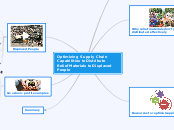af Dare Fadeji 8 år siden
483
Optimizing Supply Chain Capabilities to Distribute Relief Materials to Displaced People

af Dare Fadeji 8 år siden
483

Mere som dette
Thank you for going through my mind map on optimizing supply chain capabilities to ensure adequate distribution of relief materials to displaced people. Our world will be a better place if we all care for one another. There are 38 million internally displaced persons globally. There are a lot of wastes, especially in developed nations - We can channel our resources by preventing food wastage and sharing from our earnings with those who are internally displaced. The amount of resources (food, sanitary materials, drugs) wasted daily is more than enough to cater for all the displaced people. Getting the "potential wastes" to the right people will be the supply chain challenge - and it all starts with demonstration of genuine kindness for one another. Looking forward to a better, brighter world as a result of redistribution of excess resources!